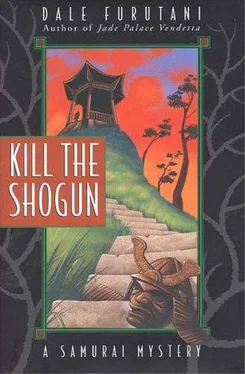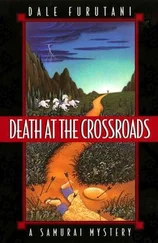Dale Furutani - Kill the Shogun
Здесь есть возможность читать онлайн «Dale Furutani - Kill the Shogun» весь текст электронной книги совершенно бесплатно (целиком полную версию без сокращений). В некоторых случаях можно слушать аудио, скачать через торрент в формате fb2 и присутствует краткое содержание. Год выпуска: 2011, ISBN: 2011, Жанр: Исторический детектив, на английском языке. Описание произведения, (предисловие) а так же отзывы посетителей доступны на портале библиотеки ЛибКат.
- Название:Kill the Shogun
- Автор:
- Жанр:
- Год:2011
- ISBN:0688158196
- Рейтинг книги:3 / 5. Голосов: 1
-
Избранное:Добавить в избранное
- Отзывы:
-
Ваша оценка:
- 60
- 1
- 2
- 3
- 4
- 5
Kill the Shogun: краткое содержание, описание и аннотация
Предлагаем к чтению аннотацию, описание, краткое содержание или предисловие (зависит от того, что написал сам автор книги «Kill the Shogun»). Если вы не нашли необходимую информацию о книге — напишите в комментариях, мы постараемся отыскать её.
Kill the Shogun — читать онлайн бесплатно полную книгу (весь текст) целиком
Ниже представлен текст книги, разбитый по страницам. Система сохранения места последней прочитанной страницы, позволяет с удобством читать онлайн бесплатно книгу «Kill the Shogun», без необходимости каждый раз заново искать на чём Вы остановились. Поставьте закладку, и сможете в любой момент перейти на страницу, на которой закончили чтение.
Интервал:
Закладка:
“I hear you gave my men a bad time,” Akinari said, not bothering with the polite pattern of introduction.
Kaze took the cup and dipped his head in thanks. Then he took the bottle and poured Akinari’s drink.
“It was more a lesson in manners,” Kaze said.
Akinari gave a snort. Kaze couldn’t tell if it was a laugh or comment. He sipped his sakè.
“That’s good stuff,” Akinari said, as Kaze took a drink. “Not the swill I serve to customers. After a few drinks, they can’t tell the difference, anyway.”
Kaze didn’t respond. The sakè was better than what he was drinking with the vegetable merchant, but it was not top quality. Either Akinari didn’t know the difference, or someone was cheating him on the sakè he was being sold. Maybe both.
“I wanted to talk to you to make sure my arrangement with the vegetable dealer will go smoothly,” Akinari continued.
“Shouldn’t you talk to the vegetable merchant about that?”
Another snort. Kaze still wasn’t sure if it was a laugh or not.
“Nobu told me you’re pretty strong. You’re the guy who can disrupt things, not that mouse of a merchant.”
“And what do you think I would disrupt?”
“Didn’t the merchant tell you?”
“No. I just rent a room from him. I have no interest in his business.”
Akinari hesitated, absorbing this information, then said, “To pay off his gambling debt to me, I’ve arranged for the merchant to haul things into the city for me, when he goes out to the country to buy vegetables.”
“What kind of things?”
“Do you know what tobacco is?”
“That weed brought to Japan by the hairy barbarians, the Europeans? The one you smoke?”
“Yes. The foreigners introduced it to Japan a few years ago. Smoking it is quite good for the health. It’s gotten popular with some people, but Ieyasu-sama hates it. He’s banned it. Says he’ll confiscate the home of anyone caught trading in it.”
“And?”
“That makes it valuable! The people who like it can’t seem to stop smoking it. I have a string of clients who will pay almost any price for it. Your vegetable merchant will make it easy for me to supply tobacco. He’ll smuggle tobacco leaves into Edo under his daikon, shiso leaves, and other vegetables. I want to make sure you won’t give us any trouble. Those tobacco smokers are real pigs about getting it, and I want a steady supply.”
Kaze finished his drink. “The vegetable merchant is nothing to me. It will be inconvenient if his house is seized by the Tokugawa authorities for smuggling tobacco, but that’s his concern, not mine.” Kaze stood up. He again gave a small nod, not a formal bow, and said, “Thanks for the drink. I have to go now. I want to take a bath, and the public bathhouse in the neighborhood closes early.”
Boss Akinari seemed surprised at Kaze’s leaving. “Now, now,” he said, “you’re a good fellow. Why don’t you take a bath here? We have our own bathhouse. I’ll call a servant to lead you there.”
Having your own bath was a luxury. Like most people in the lower classes, the vegetable merchant’s house had a privy, but not a bath. Everyone in the household used a public bath, paying a few sen for its use.
Boss Akinari bellowed out for a servant, and the gap-toothed man opened the shoji and stuck his head in.
“Take this man to the bath,” Akinari ordered.
Kaze thought, Why not? “Thank you,” he told Akinari.
“No, it’s nothing,” Akinari said, waving his hand and giving the polite response for the first time in his conversation with Kaze. “I meant it when I said you were a good fellow,” Akinari continued. “I can always use good men, especially if they’re as strong as you. I have over a dozen men, but Nobu says you’re something special. If you ever want a job with me, just say so. Say, what’s your name?”
“Matsuyama Kaze.”
Akinari’s face remained impassive, but Kaze was puzzled because he thought he saw a flicker of recognition in the gambler’s eyes. Still, the fellow was hard to read, and Kaze couldn’t figure out what his reactions meant, so he didn’t think too much of it. He followed the servant out of the room.
The surface of the water was a black mirror. The light from two paper lanterns reflected off the surface, hiding the depths in darkness. Wisps of steam emerged from the ofuro and rose into the air, disappearing into the dark light of the bathhouse. The ofuro was a large wooden enclosure, standing chest high, and filled with hot water.
Many bathhouses were open on one or more sides, especially if there was a view of a garden or some glimpse of nature. This bathhouse was an enclosed room, buried in the back of the gambling den. A sullen servant was sitting on a small stool. He looked up and gave a quick dip of his head as Kaze walked in with the gap-toothed man, who then left Kaze and returned to his post. The servant in the bathhouse didn’t seem surprised that a stranger was walking in, and Kaze surmised that the gamblers often used the bath. Dedicated gamblers might gamble for days on end, so being able to soak in a hot refreshing bath would not be an unusual amenity.
With a minimal exchange of words, the servant helped Kaze strip off his clothes and sandals. The servant carefully folded Kaze’s kimono and placed it on another stool, and invited Kaze to occupy the seat he had been perched on. Kaze sat as the servant carefully scrubbed him, using a rough cloth. Taking a wooden bucket with a handle attached to its side, the servant dipped into the ofuro to scoop out water to rinse Kaze off. As was the custom, Kaze would be clean when he entered the bathwater. There was no plumbing in the bath. The tub was filled by hand with buckets, and the water poured on Kaze was free to find its way between the slats of the floorboards and onto the earth beneath the building.
When he was thoroughly clean, Kaze stood and the servant placed the stool next to the ofuro, making it easier for Kaze to get in. The water was scalding, but Kaze eased himself into it with a welcome sigh. There was a bench seat in the tub, and Kaze sat on it, the steaming water coming up to his chin. The heat of the water flowed into his muscles, relaxing his joints.
“I’ll be outside next to the firebox,” the servant said. “If you need more heat, just pound on the wall and I’ll put more wood on the fire.” The ofuro’s water was heated by a copper firebox that intruded into the side of the tub. The open side of the firebox was outside.
Kaze nodded his understanding and watched the servant leave. Then he immediately got out of the tub, took his sword, and placed it next to the tub. He held the scabbard and pushed on the tsuba, the sword guard, until he heard the click that indicated the sword was free of the friction point that held it into the scabbard. Some samurai took baths with wooden swords in their hands, so they would be instantly ready to fend off an attack. Kaze didn’t do this, but he did want his sword, named “Fly Cutter” because of a trick that Kaze could do with it, close at all times. He got back into the tub.
Sitting in the water, Kaze closed his eyes. He was in that curious state where ignoring your surroundings makes you acutely aware of them. He let his mind drift, remembering his journey to the battlefield.
A year after Sekigahara, Kaze journeyed to the battlefield. He had never been there. Since he had no idea where the daughter of his Lord and Lady was taken, searching the central region of Honshu, the Kinki district, where Sekigahara was, was as good as searching any other part of Japan.
Although he was there to search for the girl, he also wanted to see the place where his Lord had died and where Japan had been transformed. What he found was a large, U-shaped valley, bordered by hills. The hills were covered with a wild profusion of unusually large wildflowers. They had intense colors, especially the red flowers, which were a deeper shade than any Kaze had seen before. A great number of foxes ducked in and out of the flowers, covering some hillsides so thickly that the foxes also looked like they were some kind of rust-colored flower.
Читать дальшеИнтервал:
Закладка:
Похожие книги на «Kill the Shogun»
Представляем Вашему вниманию похожие книги на «Kill the Shogun» списком для выбора. Мы отобрали схожую по названию и смыслу литературу в надежде предоставить читателям больше вариантов отыскать новые, интересные, ещё непрочитанные произведения.
Обсуждение, отзывы о книге «Kill the Shogun» и просто собственные мнения читателей. Оставьте ваши комментарии, напишите, что Вы думаете о произведении, его смысле или главных героях. Укажите что конкретно понравилось, а что нет, и почему Вы так считаете.












